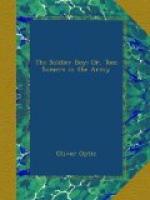The soldier boy ate the bacon, and ate both of the cakes, though each of the latter was about the size of a saucer. It was a large meal, even for a growing boy; but every mouthful seemed to put a new sinew into his frame. While he was eating, he drew the cork from the bottle. It contained whiskey. Tom had heard that there was virtue in whiskey; that it was invigorating to a tired man, and he was tempted, under these extremely trying circumstances, to experiment upon the beverage. He would certainly have been excusable if he had done so; but our hero had a kind of horror of the article, which would not let him even taste it. He was afraid that he should acquire a habit which would go with him through life, and make him what Hapgood and others whom he knew were—a torment to themselves, and a nuisance to their fellow-beings. Putting the cork in the bottle, he threw it upon the ground.
With his renewed strength came renewed hope; but he did not deem it prudent to wander about the woods at present: therefore he threw himself on the ground under the protecting log to obtain the repose he so much needed.
He thought of home, and wondered whether he should ever see the cottage of his parents again; and while he was thinking, overcome by the excitement and fatigue of the day, he dropped asleep. It was strange that he could do so, consciously environed by so many perils; but he had in a measure become callous to danger, and he slept long and deep.
When he awoke, it was dark and silent around him. The roar of battle had ceased, and the calm of death seemed to have settled upon the scene of strife. Tom’s bones still ached; but he was wonderfully refreshed by the nap he had taken. He had no idea of the time, and could not tell whether he had slept one hour or six. He was strong enough to walk now, and the first consideration was to escape from the vicinity of the rebel camps; but he had no conception of where he was, or what direction would lead him to the Federal lines.
A kind Providence had watched over him thus far; had spared his life in the fury of battle; had fed him in the wilderness, like Elijah of old; and restored his wasted strength. He could only trust to Providence for guidance, and, using his best judgment in choosing the direction, he entered upon the difficult task of finding his way out of the woods. He had walked an hour or more, when, suddenly, three men sprung up in the path before him.
“Halt! Who comes there?” demanded one of them.
“Friend!” replied Tom; though he had a great many doubts in regard to the truth of his assertion.
“Advance, friend, and give the countersign!”
But the soldier boy had no countersign to give. He had fallen upon a rebel picket post, and was made a prisoner.
CHAPTER XV.
Tom A prisoner.
Tom could not exactly understand how he happened to be made a prisoner. He had certainly moved with extreme caution, and he wondered that he had not received some intimation of the presence of the enemy before it was too late to retreat. But, as we have before hinted, Tom was a philosopher; and he did not despair even under the present reverse of circumstances, though he was greatly disconcerted.




